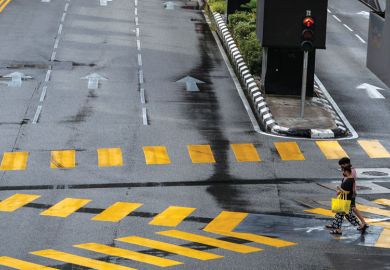Chinese graduates of Australian universities are ill-suited to their country’s workforce needs, often applying at the wrong time, in the wrong way and with the wrong credentials for the most promising job openings.
Research by Beijing-based recruitment platform Lockin has identified a “mismatch” between the career aspirations of Chinese returnees from Australian universities and the qualities sought by employers.
Lockin’s appraisal adds to fears that the perceived diminishing value of overseas degrees is threatening Chinese enrolments, which generated more than 10 per cent of Australian universities’ revenue in 2020, and as much as 30 per cent at some institutions.
“While many international graduates still enjoy an edge in salaries in China, it can often take them longer to land their first job compared to domestic graduates,” the report says. “Their time abroad can mean they…lack connections and relevant experience. The timing of their applications may be out of sync with Chinese domestic campus recruitment schedules.”
The analysis found that three-quarters of Australian returnees last year had sought positions in the investment and finance sector, which accounted for only 9 per cent of job openings.
Roughly four times as many opportunities arose in China’s “vast” technology sector which has dominated the graduate employment market for at least half a decade. But these openings only attracted interest from about half the applicants with Australian qualifications – often business degrees rather than the engineering and technology credentials sought by most sector employers.
Returnees from Australia proved about 11 percentage points more likely to have business degrees than their countryfolk with qualifications from other international destinations. Business graduates found themselves competing with roughly five times as many applicants per vacancy as people with information technology or manufacturing degrees.
The study also found that many students returned from Australia at the wrong time to capitalise on China’s “golden” autumn recruitment season for large graduate employers.
Almost half of Australian university graduates sought employment in the spring recruitment season between February and May. “In contrast, applications for returnees from other major markets spike in November, [when] job openings are at their highest,” the report says.
The analysis identified other “pitfalls and challenges” for returnees from Australia, who tended to have relatively poor English skills and unrealistic salary expectations and lacked insights into Chinese career structures and resumé protocols.
And while rankings drive many Chinese students’ university choices, their prospective bosses are far more interested in their demonstrated ability to work. Some 17 out of 20 employers last year expressed a “clear preference” for internship experience – about one-third more than in 2017.
Shane Dillon, Vietnamese-based founder of recruitment platforms JOB+ and Cturtle, said that employability and return on investment were “critical” to international enrolments. “An employer’s top priority is skills and the best way students can show this is through work experience,” he said.
Mr Dillon said that the main disadvantages of overseas study were the time spent outside home networks coupled with the host countries’ “weak” employment links for international students. Services like his helped by connecting universities’ international students with global employer networks.
The Lockin report urges Australian universities to use third-party recruitment platforms, improve their work experience offerings and engage more with Chinese employers. It says universities should also encourage Chinese business students to take “complementary” science and engineering courses and to apply for jobs between September and November.
The study analysed job applications from more than 1 million graduates of foreign universities, including almost 200,000 who had studied in Australia, for jobs posted by employers located mainly in Beijing, Shanghai, Guangzhou and Shenzhen.
Register to continue
Why register?
- Registration is free and only takes a moment
- Once registered, you can read 3 articles a month
- Sign up for our newsletter
Subscribe
Or subscribe for unlimited access to:
- Unlimited access to news, views, insights & reviews
- Digital editions
- Digital access to THE’s university and college rankings analysis
Already registered or a current subscriber?








